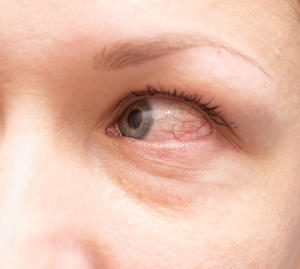
Read on to find out what red, bloodshot eyes may mean, as well as the symptoms associated with them, their causes, and some complications that may arise.
What do red bloodshot eyes mean?
Red, bloodshot eyes are eyes that have become irritated either by an internal or external factor. Your eyes may range from bright red across the entire sclera, to a few red spots or lines that are scattered around the whites of the eye.
Bloodshot eyes: Symptoms
If your eyes appear red and bloodshot, you may also experience other irritating symptoms such as a burning sensation, itchy eyes, watery eyes, swollen eyelids, thick or watery discharge, light sensitivity, and the crusting or scaling of the eyelid skin.
What causes red bloodshot eyes?
Bloodshot eyes may be caused by a variety of conditions, including:
Pink eye: Also called conjunctivitis, pink eye is a common and very contagious eye infection that occurs in the conjunctiva that makes the eyes appear pink or red.
Dry eyes: Your tear glands may not produce enough tears for your eyes to stay sufficiently nourished and lubricated, resulting in dry and inflamed eyes that appear red.
Allergies: When you come into contact with an allergen like pollen or pet dander, your body releases histamine which causes the blood vessels in your eyes to enlarge and results in red, watery eyes.
Contact lenses: Over-wearing contact lenses or using ones that have been improperly cared for can cause your eyes to appear red, as this can contribute to a build-up of irritants on the surface of the eye, as well as lead to infections.
Computer vision syndrome: Red, burning eyes can be caused by staring at a computer screen for too long, so taking breaks and using eye drops is recommended to give your eyes some rest and prevent them from becoming red and dry.
Injury: An injury or surgery on the eye can result in your eyes appearing red, as your body’s inflammatory response to injury makes the blood vessels in your eyes dilate to increase blood flow to the affected area. These enlarged and sometimes burst vessels can make your eyes red.
Corneal ulcer: Usually caused by an untreated eye infection or some sort of trauma to the eye, these ulcers are serious and can cause pain, reduced vision, and eye discharge as well as redness.
Ocular herpes: The same herpes virus that causes cold sores can also infect your eyes, turning them red and causing swollen eyes, pain, watery discharge, and eye sensitivity.
Uveitis: Uveitis is the inflammation of the uvea, or the middle layer of the eye, and can cause eye redness along with blurry vision and light sensitivity.
Glaucoma: Acute angle-closure glaucoma is characterized by a sudden appearance of painful, bright-red eyes as well as nausea and vision loss.
Whitening eye drops: These drops are designed to reduce redness by constricting the vessels in your eyes, but often cause more harm than good as prolonged use can cause the redness to worsen after the effects of the drops wear off.
Cold and flu: Puffy, bloodshot eyes may be caused by a sinus infection or blocked sinuses and further irritated by excessive sneezing, coughing, or retching.
Smoking: The tobacco smoke produced by eye irritants is a toxic eye irritant that can cause itchy, red, dry eyes.
Environmental hazards: Dry air, dust, smoke, and too much sun can irritate the eyes and cause them to appear red.
Sleep: Not getting enough sleep can turn your eyes red, and rubbing them only makes them appear worse.
Swimming: Opening your eyes underwater while swimming in a chlorinated pool or natural source of water, salt or fresh, can cause your eyes to turn red. In pools, the chlorine irritates your eyes, while the bacteria in lakes and oceans causes irritation and turns your eyes red.
Red bloodshot eyes: Complications
Complications associated with red, bloodshot eyes vary by cause. If it is an infection like pink eye, your school or work schedule may be disrupted while it heals. If your eyes are red for a more serious reason like glaucoma or trauma, it could lead to permanent damage such as loss of vision and blindness, eye scarring, and even the loss of your eye.
How to treat red bloodshot eyes
The treatment of red, bloodshot eyes varies based upon what is causing them. An appointment with your eye doctor is the best course of action for diagnosing the cause of your condition and potential treatment options. Some easy remedies include placing a cold compress on the eyes or using over-the-counter eye drops, while more severe conditions may require intervention in the form of surgery and/or anti-biotics.
Bloodshot eyes: Prevention tips
You can help prevent the development of red, bloodshot eyes in certain cases. For red eyes caused by infection, be sure to wash your hands frequently and avoid sharing face towels and eye makeup like mascara. Red eyes caused by allergies may be prevented through the avoidance of allergens, or taking anti-histamines. Also, avoid rubbing your eyes as this can worsen the redness and potentially scratch your cornea. If you work at a computer, take breaks throughout the day to rest your eyes and prevent redness, and if you wear contacts be sure to take them out when you are supposed to and keep them in a clean, sanitized case.
When to see a doctor
It may be necessary to see your doctor if your red eyes are accompanied by impaired vision, or significant pain, as well as if you have recently suffered a head trauma, chemical injury, or have had eye surgery.
Eye health is extremely important, and while red, bloodshot eyes may not always be caused by a serious condition, checking with our doctor when they first appear may prevent further, more serious complications.
Related: Getting rid of eye floaters: Home remedies and exercise